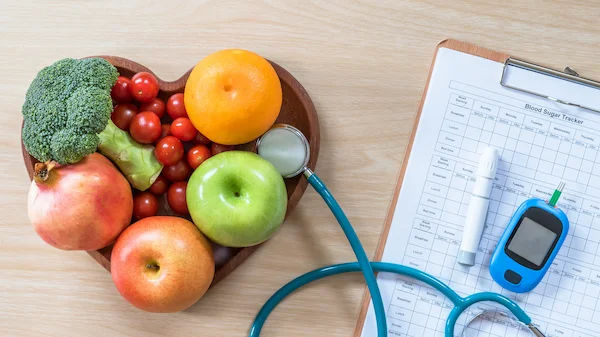Is Guava Good for Diabetes? Exploring The Health Benefits
Wondering if guava is good for diabetes? Discover its health benefits, impact on blood sugar levels, and how it can be a healthy addition to a diabetic-friendly diet.

Written by Dr Shreya Sarkar
Last updated on 3rd Jul, 2025
Guava, a tropical fruit known for its vibrant colour and sweet, tangy flavour, is often praised for its numerous health benefits. But if you have diabetes, you may be wondering if guava is a suitable choice for your diet. Guava can be a great addition to a diabetes-friendly diet when consumed in moderation. In this article, we’ll explore the health benefits of guava for people with diabetes, its impact on blood sugar levels, and how to incorporate it into your diet.
Nutritional Profile of Guava
Guava is a nutrient-rich fruit that offers a variety of essential vitamins and minerals. Here's an overview of its key nutritional components:
Low Glycemic Index (GI): Guava has a GI of 12-24, which means it is digested and absorbed gradually, leading to a slow and steady rise in blood sugar levels.
High in Fiber: One hundred grams of guava contains approximately 5.4 grams of fibre. Fibre helps regulate blood sugar by slowing the absorption of glucose into the bloodstream.
Low in Calories: Guava is low in calories, with 100 grams containing just 68 calories. This makes it a great option for weight management, which is essential for diabetes control.
Rich in Potassium: Guava is high in potassium, with 417 milligrams per 100 grams. Potassium helps regulate blood pressure and supports overall cardiovascular health.
Vitamin C: Guava is an excellent source of vitamin C, providing 228 milligrams per 100 grams. Vitamin C boosts the immune system and helps fight chronic diseases like diabetes.
Antioxidants: Guava contains antioxidants such as beta-carotene and lycopene, which help combat oxidative stress and reduce inflammation.
Glycemic Index and Its Relevance to Diabetes
The glycemic index (GI) is a valuable tool for individuals managing diabetes, as it helps them understand how different foods affect their blood sugar levels. The GI measures how quickly a carbohydrate-containing food raises blood sugar levels compared to pure glucose, which has a GI of 100. Foods are categorised into three groups based on their GI values:
High GI: 70 or above
Medium GI: 56 to 69
Low GI: 55 or below
For diabetics, consuming low-GI foods can help maintain stable blood sugar levels by causing slower, more gradual increases in blood sugar. Since guava has a low GI of 12-24, it is an excellent choice for steady blood sugar levels and reducing the risk of rapid spikes after meals.
How Guava Affects Blood Sugar Levels
Managing diabetes involves balancing blood sugar levels and maintaining a healthy weight. Fortunately, guava can assist with both. This tropical fruit is rich in nutrients, fibre, and antioxidants, which support blood sugar control and overall health.
Guava regulates blood sugar by inhibiting sugar-degrading enzymes like maltase, sucrase, and α-amylase. This action slows sugar digestion and reduces blood glucose spikes after meals. Additionally, guava leaf extract and tea may lower fasting blood glucose levels and improve glucose response after carbohydrate intake. With its low glycemic index and high fibre content, guava helps stabilise blood glucose levels effectively.
Health Benefits of Guava for People with Diabetes
Guava offers several health benefits, especially for people managing diabetes. Here are some key reasons why guava can be a valuable part of a diabetes-friendly diet:
Blood Sugar Control: The low GI and high fibre content of guava help stabilise blood sugar levels. Consuming low-GI foods regularly can prevent post-meal blood sugar spikes, which is crucial for diabetes management.
Weight Management: Guava is low in calories and high in fibre, making it an excellent option for promoting satiety and preventing overeating. Maintaining a healthy weight is essential for managing diabetes.
Antioxidant and Anti-Inflammatory Properties: Guava is rich in antioxidants like beta-carotene and vitamin C, which help combat oxidative stress and reduce inflammation. These properties are beneficial for overall health and may help prevent complications associated with diabetes.
Supports Eye Health: Vitamin A, derived from beta-carotene in guava, plays a crucial role in maintaining eye health and preventing vision problems, which are common in individuals with diabetes.
Promotes Digestive Health: The fibre in guava supports healthy digestion, reduces the risk of constipation, and promotes regular bowel movements. Proper digestion aids in the absorption of nutrients and helps maintain steady blood sugar levels.
Processed Guava and Diabetes
Processed guava, including products like guava juice, canned guava, and guava paste, often contains added sugars and lacks the beneficial fibre found in fresh guava. The addition of sugars to processed guava products can lead to quicker increases in blood sugar levels, making them less ideal for individuals managing diabetes. Moreover, the processing of guava typically removes much of the natural fibre, which is crucial for slowing sugar absorption and preventing blood sugar spikes. The loss of fibre, along with potential nutrient degradation during processing, diminishes the overall health benefits of guava. Therefore, while processed guava may offer convenience, it's important to opt for fresh guava to manage blood sugar levels better and reap the full nutritional benefits.
How to Include Guava in a Diabetes-Friendly Diet
There are many delicious ways to enjoy guava as part of a diabetes-friendly diet. Here are some ideas for incorporating guava into your meals:
Fresh Guava: Simply wash and slice fresh guava for a quick and nutritious snack. You can eat it as-is or pair it with a handful of nuts or a small serving of yoghurt for a balanced snack.
Guava Smoothie: Blend fresh guava with other low-GI fruits (such as berries or avocado) and a protein source (like Greek yoghurt or protein powder) for a delicious and filling smoothie.
Salads: Add sliced or cubed guava to salads for a sweet, tropical twist. Pair it with leafy greens, a lean protein (like chicken or tofu), and a light vinaigrette for a refreshing meal.
Guava Chutney: Guava chutney can be a flavorful addition to your meals, especially when paired with grilled meats or vegetables. Be sure to make your chutney at home so you can control the sugar content.
Baked Goods: You can incorporate guava into low-carb, diabetes-friendly baked goods like muffins or quick breads, but be sure to use alternative sweeteners like stevia or monk fruit to avoid raising blood sugar.
Is Guava Juice Good for Diabetics?
Guava juice can be beneficial to a diabetes-friendly diet when consumed in moderation and without added sugars. Its low glycemic index and nutrient-rich profile make it a good choice for managing blood sugar levels and supporting overall health. However, it's important to monitor portion sizes and consult with a healthcare provider to ensure it fits into your individual diabetes management plan.
Guava Leaves and Diabetes
Guava leaves are rich in antioxidants like quercetin, kaempferol, and catechins, which help reduce oxidative stress linked to diabetes. These compounds protect the pancreas and support metabolic health, aiding diabetes management. Studies have shown that guava leaf extract can inhibit the alpha-glucosidase enzyme, which breaks down starch to release free sugar, helping to reduce blood glucose levels after meals.
Conclusion: Is Guava Good for Diabetes?
Guava is a nutritious and diabetes-friendly fruit that offers numerous health benefits. Its low glycemic index, high fibre content, and rich array of nutrients make it an excellent addition to a balanced, diabetes-friendly diet. Whether you enjoy it whole, juiced, or incorporated into various dishes, guava can help with blood sugar control, weight management, and overall health.
If you have specific questions about how to incorporate guava into your diabetes management plan, consulting with a healthcare provider or dietitian is always a good idea for personalised advice.
Consult Top Endocrinologist
Consult Top Endocrinologist

Dr. Nithin Reddy Modhugu
Endocrinologist
6 Years • MBBS, MD (General Medicine), DNB (Endocrinology)
Hyderabad
Dr. Nithin's Endocrine Clinic, Hyderabad
(100+ Patients)

Dr. Gayatri S
Endocrinologist
4 Years • Suggested Qualifictaion- MBBS, MD (Internal Medicine), DM (ENDOCRINOLOGY)
Nellore
Narayana hospital, Nellore

Dr. Venkata Rakesh Chintala
Endocrinologist
8 Years • MBBS,MD( GEN MEDICINE), DM ( ENDOCRINOLOGY)
Krishna district
Sanjeevani Hospital, Krishna district

Dr. Shiva Madan
Endocrinologist
10 Years • MBBS , MD (General medicine) , DM (Endocrinology)
Bikaner
Sushma diabetes and Endocrine center, Bikaner

Dr. Arunava Ghosh
General Physician/ Internal Medicine Specialist
9 Years • MBBS,MD(GENL.MED.),DM(ENDOCRINOLOGY)
Kolkata
VDC Clinic, Kolkata




